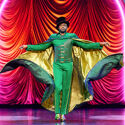Daniel Villarreal is on the ground in Austin covering the SXSW Film Festival Below, he reviews Clay Liford’s lesbian sci-fi flick, Earthling.
Less than a month before he began shooting his sci-fi pic, Earthling director Clay Liford cast a woman in his lead role. Which called for a man. The film already had a leading lady, Rebecca Spence, but none of the young actors that Liford auditioned to play her James Dean-esque co-star impressed him. That’s when he discovered Amelia Turner, a young actress auditioning for another movie across the hall. After one audition, he cast Turner into the male role, changed the character of Harry to Abby, revised all the pronouns in his screenplay, and called his female lead to say, “Hey, you know that heterosexual sex scene you were going to be having? Well… not anymore.” Spence trusted Liford’s judgement, but Liford had to start re-thinking several scenes including a knock-down drag-out fight, a suggestive rape scene, and, of course, that heterosexual sex scene.
Even before he added the lesbian twist, Liford had already written a sci-fi genre film with a strong female protagonist. Earthling follows Judith (Spence), a teacher growing increasingly distant from her husband after a car accident terminates her pregnancy. Her wreck occurs at the same time that a space shuttle with only one survivor re-enters the earth’s atmosphere. Afterwards, Judith begins having visions of people she’s never met and finds herself inexplicably drawn to her newly-enrolled female student, Abby (Turner). Over time, Judith realizes that she’s either an alien, has an alien living inside her, or is being manipulated by a shadowy alien race—either way, it doesn’t bode well for her, the aliens, or future of our planet.

“I love Alien,” Liford tells Queerty. “But [having Sigourney Weaver play the ass-kicking heroine] inspired bad trends in action sci-fi. Like strong men written as women. [Writers] gave them boobs and nothing else even remotely feminine. I wanted sexuality—not sex appeal, but biological sexuality—to come into play [in my script].”
How about we take this to the next level?
Our newsletter is like a refreshing cocktail (or mocktail) of LGBTQ+ entertainment and pop culture, served up with a side of eye-candy.
According to Liford, switching his male actor to a female affected his film’s dynamics in wholly positive ways—it’s now much more subtle and less overt. He decided to use a touch rather than a tackle in the fight scene between Ms. Turner and co-star Peter Greene. His rape scene became less about domination and more about desire. And the sex scene between the women reunites two long lost lovers, a sense many of us feel when we finally get to touch one of our own. But his female characters hardly do everything with a velvet touch: they’re deceptive, murderous, and sexually-aggressive creatures willing to down shots, fuck students, and slit throats if they have to.
Earthling‘s an ambitious and beautifully shot film with nods to the sci-fi cinema classic The Blob; Charles Burn’s graphic novel of teenage deformity, Black Hole; and the drawings of oceanic microbiologist Ernst Haeckle. But its backstory gets weighed down by expository dialogue rather than the strong visual storytelling Liford perfected in his directorial debut A Four Course Meal. Even his recent Sundance short My Mom Smokes Weed combined humor and pathos to create sympathetic and complex characters. In contrast, Earthling‘s character relationships seem almost deliberately unclear—the film’s intriguing, but ultimately more confusing than thought-provoking.
A big difference between the undercover aliens in Earthling and those in, say, Men In Black is that Liford’s aliens aren’t self-aware. They gradually discover their true identity alongside the audience, like some of the cylons in Battlestar Galactica. “It’s a metaphor for so many things in life, feeling like an outsider,” Liford says. “It’s been the subtext in vampire movies for so long and I finally wanted to bring it to the foreground.”
RATING: Two out of five human-eating aliens. You’ll never forget the beautiful shots in this uniquely lesbian sci-fi, but My Mom Smokes Weed is probably a better intro to Liford’s directorial talents.



















REBELComx
Speaking of Alien, it might be worth noting that Ripley was originally written as a man as well. There was supposed to be a lot of heavy homoeroticism throughout the story. Producers decided to change Ripley to a woman so it would stand out against the mostly male dominated genre.
gomez
Jason will not be pleased to hear this.
Hilarious
Sci-fi or soft-core porn? I can’t tell what this is trying to be based on the description.
vibrators
really as it will be odd for jeson. unwanted,unexpected,and unaccepted also.
jason
When a straight-identifying man directs lesbian characters in a movie, it’s usually from an exploitative perspective. Their so-called embrace of lesbian characters is phony – it’s a phony acceptance based on titillation.
In fact, I’d go so far as to say that 95% of all lesbian depictions on American film/TV are from the perspective of sleazy straight guys.